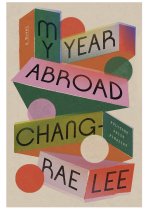So, SS, did you enjoy The Paris Library? Or maybe you haven't had a chance to read it yet?
I've yet to pick it up from the library, and have already carefully put several library books - I spent a few days last week reading books - into my briefcase for return to the library, tomorrow or the next day.
@JamesMike requested my thoughts on The Autumn of The Ace (the concluding volume of the latest trilogy by Louis de Bernieres).
It is the concluding volume of a trilogy (the story of which - over all three books - spans a number of characters and their families over the course of much of the twentieth century), and, as such, perhaps, strikes a sort of (unintentional) elegiac note, a note already strongly alluded to, in the title (The Autumn Of The Ace).
Really, it is a book about farewells, goodbyes, death, dying and making peace with the inevitability of one's own mortality. In fact, I suspect that de Bernieres is not simply saying farewell to the characters in the trilogy, but to characters across his entire oeuvre, for The Autumn Of The Ace slyly references some of his other works, as characters from these books make fleeting (or not so fleeting) cameos, or brief flying visits, where their stories intersect with the stories of the characters in The Autumn Of The Ace.
(For those who have read de Bernieres extensively - and I have - you will recognise characters from Captain Corelli's Mandolin, The Partisan's Daughter, the War of Don Emmanuel's Nether Parts, and Notwithstanding, as they make their entrances, or make themselves known, fleetingly or otherwise).
Actually, increasingly, I am coming to the conclusion that Louis de Bernieres is one of those authors who has written one exceptional book (Captain Corelli's Mandolin) and nothing else he has written before or since comes close to that masterpiece, where everything came together, and the story, setting and characters all worked perfectly.
The strengths of this book lie in the pleasure of recognising the cross references to his other works, and a genuinely powerful and superb passage where the protagonist (the Ace of the title, he was a hero from the First World War as well as the Second World War) travels to what had become Pakistan after (near the Afghan border) a few years after Indian Independence to bury his brother who had served in the old Frontier Scouts of the Indian Army (of British Imperial India, the Raj), and who had always loved the North West Frontier.
Another strength is the lovely relationship, but far too little space is devoted to it - it is rare enough to see middle aged enduring affection and love depicted anywhere, whereas young love is never short of stories - depicted between a clergyman (also a decorated war hero from the First World War) and his wife, the sister-in-law of the protagonist, who had married the clergyman towards the end of the First World War.
And he depicts male relationships - friendships, relationships, comrades, familes - very well, and is endlessly understanding of - and exceptionally sympathetic to - male short-comings almost irrespective of what they do.
As for short-comings: The entire book is a farewell, whereas most of the characters don't actually die until the story is well underway.
And there is the inescapable fact that ever since de Bernieres went through an acrimonious marriage or relationship breakdown, well over a decade ago, he has struggled with female characters; these days, although he tries hard, he finds it a challenge to write with insight, or empathy, or sympathy, or, at times, even liking, for female characters, whereas he is instinctively sympathetic to his male characters.
Much of the time, he doesn't "get" women, and it becomes clear that he doesn't really actually like them all that much, even when the male characters treat them poorly and with contempt.
So, I'll still read de Bernieres, but I suspect that his best work may be behind him.



